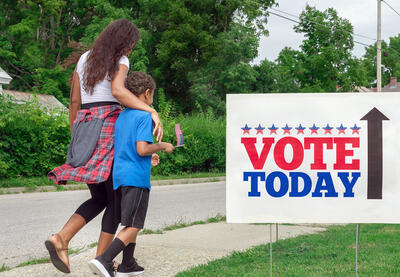Since the founding of what would become the United States, white supremacists did not intend for voting and civic engagement to be inclusive. Historically, straight white men who own land have been at the top of the racial hierarchy in our nation. That doesn’t mean it has to be that way. We can uphold the ideals of democracy explicitly expressed in the Constitution and make them work for all of us.
Thankfully, people marginalized by those in power—from Black and Indigenous people to all women, children and the LGBTQ+ community—have consistently challenged oppressive structures and given us a blueprint to fight for a true democracy. Young people have always been at the forefront of these movements, grounding the work in core values of diversity and inclusion. Today’s youth need the tools to navigate our world and address issues affecting our futures.
Young people must be engaged in the present to build and maintain an infrastructure that makes it feasible to become active participants in a diverse democracy.
Learn From and Celebrate Defenders of Democracy
When we uplift those who’ve fought for social justice, it balances these often painful narratives of struggle with a sense of triumph and celebration. Acknowledging and celebrating defenders of democracy also helps us tell the complete story of the U.S. It allows us to identify why these heroes had to fight and how their activism affects us all today.
It’s also essential to go beyond learning about people and places that make headlines or are found in textbooks. Connect with the people in your communities who have fought—and continue to fight—for our rights.
Charles Person, one of the original Freedom Riders, reminds us about the critical role of individuals in a movement—no matter how small. He says it’s imperative to acknowledge and celebrate people who sacrificed their livelihoods, and even their lives, in efforts to create a more just society.
“A lot of times we, and especially in a city like Atlanta, we can always look at the Kings and the Abernathys and those families who have done a lot of things,” Person said in a 2022 interview with Learning for Justice. “We forget about the people who haven’t been elevated to the same level as the Kings or the Abernathys.”
We can champion people in our communities who model civic responsibility. These could be local activists, historians, educators, caregivers or anyone who counters efforts to suppress people’s rights.
Connect Civics Learning to Community Action
Young people need opportunities to engage with political discourse and social justice movements. Some argue there aren’t enough opportunities to allow Black and Latine/x youth, particularly those in low-income areas, to participate in civic duties. For example, in an essay for Chalkbeat, Yale student Caleb Dunson writes that Black youth like himself need access to civic education courses and internships and mentorship programs with elected officials or activist organizations. Dunson also notes there is value in connecting what is learned in class to current issues in the community.
“For example, a lesson on political institutions could prompt a discussion on how America’s governing bodies both uphold and challenge racism,” Dunson writes. “A lesson on elections could focus on current voter suppression efforts or how to be an informed voter in the 21st century. And a lesson about political propaganda could teach students how to assess the credibility of information sources.”
Activate!
Tips for Civic Engagement
Here are a few ways young people can organize around voting rights and increase civic engagement in their communities:
- Volunteer to be part of a voter registration drive.
- Host or participate in a debate watch party. This is one way for community members to get acquainted with issues that impact their community and to witness how leaders relate to those issues. The League of Women Voters Education Fund offers tips for a successful watch party.
- Attend community discussions about what’s on the local ballot. Legislators and high courts have been striking down voting rights provisions, affirmative action policies, inclusive education initiatives, and efforts to improve young people’s quality of life, such as student loan forgiveness. In addition to voting rights, it’s important now more than ever to uplift these issues. Get to know what’s on your community’s ballot and which candidates are running for office by visiting VOTE411.
- Offer digital spaces to include those who can’t appear in person at community events. Many social media platforms offer tools to host virtual events and Q&As. You can also livestream an in-person event.
For Parents and Caregivers
- Talk to children about civic duties you perform, such as voting, jury duty and community service. When appropriate, allow young people to accompany you while performing civic duties.
- Help youth stay informed. Reading the newspaper, watching the evening news together, discussing current events or attending a community town hall are a few ways to spark young people’s curiosity about what is happening around them.
- Start instilling media literacy at a young age to help combat mis- and disinformation. Monitor and guide young people’s media use, including their intake of news sources, social media and blog posts.
- Emphasize hope. It’s easy to become overwhelmed or cynical when learning about our country’s history and the realities of oppression. But as Dr. Martin Luther King Jr. said, “We must accept finite disappointment, but never lose infinite hope.”
